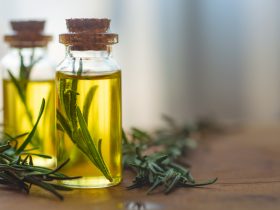Your skin’s barrier is like a protective shield that guards your body against harmful free radicals. Harsh environments often cause a damaged skin barrier. To keep it strong, consider using beneficial elements like oils and ceramides.
When you wander through beauty boutiques or drugstore aisles, you’ll encounter various products designed to enhance and revitalize your skin. Some exfoliate, some enhance plumpness, and others provide moisture.
All these products share a common goal: they work on the outermost layer of your body, known as the skin barrier.
But what exactly is this skin barrier, why is it important, and what factors can harm it?
Within this article, we will answer these questions and guide you on the measures you can adopt to safeguard and rejuvenate this essential protective shield.
Have you ever wondered about your skin barrier and its purpose?
Your skin comprises different layers, each with a specific role in safeguarding your body.
The outermost layer, the stratum corneum, is often likened to a brick wall. It consists of strong skin cells called corneocytes, held together by lipid “mortar.” This structure forms your skin barrier.
You’ll discover keratin and natural moisturizers within these skin cells, similar to bricks. The lipid layer contains vital components like cholesterol, fatty acids, and ceramides.
Remarkably thin, this brick wall is more than just a metaphor. It’s your literal lifeline. Without it, harmful environmental toxins and pathogens could invade your skin, causing internal harm.
Furthermore, your skin barrier prevents the loss of internal water through evaporation. Without it, dehydration would be a constant threat.
Ensuring the protection of your skin barrier is crucial for your overall well-being and the proper functioning of your body.
Factors That Can Harm Your Skin Barrier
Your skin barrier works hard every day to shield you from various threats. Some challenges arise externally, while a few originate from within your body.
Numerous external and internal elements can impact your skin barrier, such as:
- Environmental Extremes: Excessively humid or dry conditions can affect your skin barrier’s health.
- Allergens and Pollutants: These external factors can disrupt your skin’s protective function.
- Sun Overexposure: Too much sunlight can compromise your skin barrier’s integrity.
- Harsh Cleansers: Alkaline soaps and detergents can strip away essential lipids.
- Chemical Exposure: Contact with harsh chemicals can damage your skin barrier.
- Excessive Exfoliation and Cleansing: Overdoing exfoliation and washing can weaken your skin’s defense.
- Steroid Use: Certain medications, like steroids, can impact your skin’s natural protective abilities.
- Emotional Stress: Psychological distress can also influence your skin barrier’s health.
- Genetics: Genetic factors can make you more susceptible to skin conditions like atopic dermatitis and psoriasis.
The Importance Of Acid Mantle
Your skin barrier is slightly acidic, known as the acid mantle. This gentle acidity plays a crucial role in safeguarding your skin. This protective acidity protects against harmful bacteria, viruses, and fungi. These microorganisms could otherwise harm your skin, causing infections and various skin issues.
Maintaining the acid mantle becomes especially critical around wounds. The skin’s acidity is pivotal in numerous biological processes essential for proper healing.
Sometimes, health conditions like diabetes or incontinence can alter your skin’s natural acidity, weakening this protective layer. Experts recommend slightly more acidic skin care products for individuals facing such conditions.
Recognizing Skin Barrier Damage
If your skin barrier isn’t working as it should, you might experience various skin issues. These could include:
- Dry and flaky skin
- Persistent itching
- Uneven or discolored patches
- Breakouts of acne
- Irritated or inflamed areas
- Increased risk of bacterial, viral, or fungal infections
Preserving and Restoring Your Skin Barrier
Maintaining a healthy skin barrier and acid mantle is crucial. To achieve this, consider these five straightforward approaches:
Simplify Your Routine
If your skin creams involve too many products, they might unintentionally harm your skin barrier. Consult a dermatologist or skincare expert to identify essential and effective products. For exfoliation, softer methods are better for sensitive or darker skin tones.
Mind the pH
Your skin’s acid mantle thrives at around pH 4.7. Opt for cleansers with pH levels between 4.0 and 5.0 to maintain balance. Proper pH can shield against conditions like acne and infections.
Embrace Plant Oils
As indicated by 2018 research, certain plant oils repair and safeguard the skin barrier while preventing moisture loss. These oils offer antibacterial, anti-inflammatory, and antioxidant benefits. Examples include jojoba, coconut, almond, and rosehip oils.
Utilize Plant Oils
Apply barrier repair cream or lotions infused with these oils, or massage a small amount directly onto your skin for absorption.
Hydration and Nutrition
Drink ample water and consume foods rich in omega-3 fatty acids, such as fish and flaxseeds. These actions support overall skin health and barrier function.
Adopting these strategies can foster a resilient and healthy skin barrier, ensuring your skin remains protected and radiant.
Choosing Products with Ceramides
When selecting skin barrier repair products, keep an eye out for those that contain ceramides. Ceramides are like waxy lipids, and they’re present in higher amounts in the outermost layer of your skin, known as the stratum corneum. These substances play a vital role in ensuring your skin barrier works appropriately.
Recent research from 2019 has indicated that products with pseudo-ceramides could assist in relieving dryness, itchiness, and scaling caused by a weakened skin barrier. Moisturizers rich in ceramides enhance the overall strength of your skin’s protective barrier.
If you struggle with acne, ceramide-infused moisturizers could be particularly beneficial. Acne-prone skin often deals with a compromised barrier, and acne treatments can result in dryness and redness. Products containing ceramides may also offer protection for darker skin tones. A 2014 study review suggests that individuals with darker skin tones tend to have lower levels of ceramides.
Choose Moisturizers with Hyaluronic Acid, Petrolatum, or Glycerin
If you’re dealing with dry skin, you’re not alone, and moisturizers can be a great solution.
An occlusive moisturizer plays a helpful role in maintaining your skin barrier by reducing the amount of water that escapes from your skin. These products create a thin layer on your skin’s surface, which helps prevent moisture loss.
Among the occlusive moisturizers often suggested, petrolatum is one of the top choices. According to experts, it can effectively block up to 99% of water loss from your skin.
Similar to occlusive moisturizers, humectants are also beneficial for enhancing barrier function. Humectants attract water, either from the environment or within your body, and then lock it into your skin’s protective layer. Researchers recommend looking for products containing hyaluronic acid, glycerin, honey, and urea as effective humectants.
Remember, not all skincare ingredients suit everyone. This is why testing different products can help you determine the best one to maintain your skin’s health, protection, and proper moisture.
In Conclusion
The outer layer of your skin called the skin barrier, serves as a shield against outside threats and preserves your body’s vital water balance.
If you experience issues like dryness, itching, or inflammation may indicate a disruption in this vital shield.
You can aid in restoring your skin’s barrier by:
- Simplifying your skincare routine
- Opting for products with the right pH level
- Using moisturizers containing ceramides or humectants like hyaluronic acid
- Petrolatum-infused moisturizers can also help lock in moisture for your skin barrier.
Your skin barrier is your body’s primary defense against environmental challenges. Ensuring its well-being goes beyond looks; it’s a critical part of overall health.
















Find Us on Socials